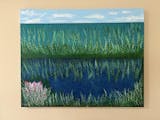Roberto Parada is an internationally known oil painter and illustrator, having been published in Time, Newsweek, Rolling Stone, ESPN The Magazine, Entertainment Weekly, Esquire, and Huffington Post. Few people know that his art process came close to ending his life in 2004.
I had the honor of interviewing him about his journey in discovering which of his art supplies were literally killing him, how it happened and what he did to change his process while continuing to paint very high quality, archival and professional paintings.

Were you ever taught about the toxicity in art supplies in art school?
I went to a very prestigious art school in the late 80’s and early 90’s and was never taught about any hazards in art supplies by my painting and illustration teachers. I did have one sculpture teacher who adamantly forbade the use of fixatives, solvents and chemicals because he had gotten lymphoma from the use of those chemicals. He never really explained why we shouldn’t use them but just told us not use them in his classroom. My painting teachers all used toxic materials themselves and probably just didn’t know the health risks involved.
What was your painting technique throughout your school years and career?
I have always been an oil painter and I’m guilty of never wearing gloves or having adequate ventilation or even thinking that I should. No one ever taught me the risks and on the warning labels on paint thinners I only saw warnings about difficulty breathing and respiratory issues. There was nothing about the fact that it can get into your bloodstream and cause death risks. The warnings are very ambiguous and limited considering the fact that I can list 5 different types of cancer that come from paint thinners. For example, 3 kinds of leukemia AML, ALL, CLL, and Multiple Myeloma and Non-Hodgkin Lymphoma. I also used all of the heavy metal based paints – cadmiums and cobalts – and didn’t think much about it. In the 90’s the “Odorless Mineral Spirits” came onto the market and we all thought that this was a healthier alternative. Now I know that Odorless mineral spirits still have petroleum based distillates and benzene which is exactly what brought about my illness.

Will you talk about what exactly your illness was and how you contracted it?
Paint thinner was my ultimate downfall. Through the illness process I learned that paint thinners evaporate into the air and you then absorb the benzene (which is an odorless carcinogen and in petroleum products and can do huge amounts of damage besides cancer). You absorb the benzene through your nose, skin and eyes, which most people don’t realize, and it goes directly into your bloodstream. I absorbed it in a slow progression over many years. When benzene gets into your bloodstream and into your bone marrow (where you make your blood) then your white count lowers.
In most cases, that kind of exposure over the long term would cause lymphoma or leukemia. I got something different – Severe Aplastic Anemia which is an autoimmune reaction. My T- cells, which are your warrior cells in your immune system, began destroying things that it sees as foreign and it started seeing my bone marrow as foreign. There was no way to turn this response off.
Looking back I see that I had years of weak, low blood counts and I didn’t realize it. I was always tired but thought it was normal.
What can be done if you have aplastic anemia?
First, I removed all exposure to solvents and toxins. Many people die from this illness because when your marrow’s being destroyed you don’t have any defenses or immunity to outside viruses or infections.
They do these treatments where they re-boot your whole immune system. They get antibodies from a horse and mix it with a serum (ATG) and you use it for 4 days. It basically wipes out everything (blood cells, white cells, platelets) and then you have to get blood transfusions once or twice a week for 2-3 months.
Did this help?
My platelets unfortunately never came back up so I had to do it again. It was such a shock to my marrow that it still didn’t come back after the second time. I still continued to paint and had good days right after a transfusion but on bad days I couldn’t do anything but sleep. I did everything I could do to protect myself from toxins and infections but I still felt like I was falling apart. I bled very easily from my gums and nose. I continued to get platelet transfusions until one day I had to go to the emergency room. I had a 0 platelet count (platelets are 30% of your blood) and I was so vulnerable that a hard bump to the head would have killed me.
I was very worried to get a full bone marrow transplant which is the last option because it is extremely risky and dangerous. But I ultimately decided to because a life like this was so lousy. I’m incredibly lucky that I had a bone marrow donor, Hector, who was extremely generous and brave and is now fine and healthy.

What changed after the transplant?
Amazingly I had no real complications. I felt extremely tired and fragile and could barely walk 2 blocks. I then felt like I was slowly recovering but my immune system was like a 1 year old. About 1 ½ years later I had double pneumonia and had to go back into the hospital. Since then I have been recovering and have learned to be very careful. I’m okay now and out of the woods of danger but I could always contract another illness if I’m not careful.
How did you change your painting process?
I tried using acrylic and hated it and discovered that it also contains toxic ingredients. So I decided to go back to oil but do it in a different way. I wanted to now avoid Cadmiums, cobalts and heavy metal colors and I chose new paints that had alternative but similar colors to the toxic ones. I use oil to clean my brushes instead of paint thinners and realized how simple it was to eliminate solvents and have no fumes and no exhaustion from headaches.
I adjusted my painting style just a little bit but it wasn’t a challenge. It wasn’t that hard. I paint with walnut oil and walnut alkyd medium as my medium.
I know you’re a teacher of college age Illustration students. Do you have any advice for this next generation of painters?
For students, unfortunately most find that there is little incentive to work in a safe way until they get sick. And artists are sometimes the least health conscious people since they’re mostly just thinking about the quality of the art. Most just don’t know how easy and inexpensive it is to paint in a safe way.
My advice to young artists is to make your life really simple and eliminate toxins from your painting process. If you don’t you may have a lifetime of issues and it may shorten your life.
I just want my students to know that this is the reality of how I work and it’s totally feasible to be professional, produce very high quality work and work this way.
The famous artist, John Currin used to use lots of chemical concoctions and toxic mediums and then switched back to the pure simplicity of oil and paint.

Are there any other benefits to painting safely?
My brushes have lasted longer and stayed conditioned because my solvents would eat away at the bristles in the past. Also, I save a lot of money. It’s very cost effective to work healthier. I save money on brushes and on buying solvent (which was very expensive). Artists would save money on medical bills which is important since most artists don’t have insurance. Painting with all of these chemicals is basically an expensive way to kill yourself.
Do you see hope for the future?
Yes, it’s so encouraging to see that the consciousness about working healthier is starting to happen now in contrast to how it was in my art school days when people would spray fixative right next to you in a classroom. I have a lot of hope for the future of non-toxic art processes and I’m so glad word is now spreading.
Interested in learning more about Natural Earth Paint artists? Visit our Eco Artists page!
Follow us on Instagram, Facebook, and Pinterest for more natural inspiration.







